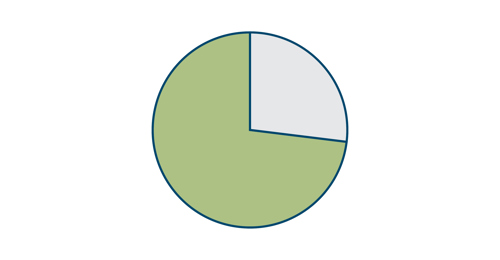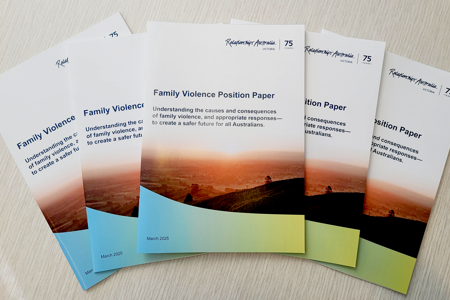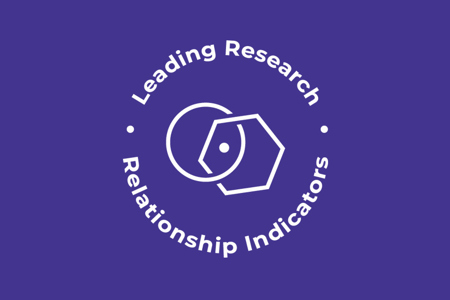
Current projects
To ensure that our work is data-informed, we continuously undertake research and evaluation projects across key service areas, including family dispute resolution, children and families, and family violence.
Family Dispute Resolution (FDR) and Separation
- Models of child participation in family mediation: a review
- Analysing the costs and benefits of FDR
- FDR for clients intending to go to court: More than just a tick-box exercise?
- Legally assisted FDR
- Post-Separation Co-parenting Apps: Can They Help Families Avoid Conflict? Australian Research Council Linkage Grant
- Relationships Australia Family Dispute Resolution Outcomes Study
- AccessResolve Property Dispute Resolution Study
- Family Violence Position Paper
- Perpetrator Program Attrition and Participant Engagement Strategies
Child and family-focused prevention and early intervention projects
- Strengthening Family Relationships in the City of Yarra: An Evidence-Informed, Place-Based Approach
- ‘Respect and Connect program’: Strengthening the Evidence Base
Relationships Australia National
- Relationship Indicators
- National surveys
Family Dispute Resolution and Separation
Models of child participation in family mediation: A review
2024–25
Children have a right to be involved in decisions that affect them, but rarely participate in family mediation, or FDR in Australia. Children’s opportunities to be involved in mediation/FDR rest on whether services can adopt workable and affordable practice models inviting their participation. In 2024–25, we undertook a literature review on models of children’s participation in family mediation, to help providers like RAV consider ways to involve children and ultimately support greater uptake of child-inclusive practices.
Our review showed limited literature detailing family mediation models and practices that invite children’s views. Despite this, we identified examples of 5 different approaches. We described, differentiated and mapped model types. More research is needed to compare the efficacy and assess the suitability of different models in different contexts.
In 2025 we presented on our review at the Child Inclusive Practice Forum hosted by Family and Relationships Services Australia, and at the Pacifica Congress.
Analysing the costs and benefits of FDR
2024
Cost–benefit analysis is a comprehensive and evidence-based method for systematically evaluating the economic, social and environmental impacts of programs. In 2024, we advanced our project to demonstrate the value and impact of our FDR service, as well as report outcome measurement and qualitative data.
The results of this project will guide the delivery of effective and cost-effective services, and allow us to articulate the impact of our programs within the sector and to government. It will also support us to illustrate the value of services to clients that, in turn, will help them to evaluate and make informed decisions about services and how to resolve their family law disputes.
FDR for clients intending to go to court: More than just a tick-box exercise?
2023–24
Separating parents are legally required to try FDR for parenting disputes before they can go to court. This can mean that FDR can sometimes be seen as a ‘tick-box’ exercise for parents who have no expectation of negotiating an agreement. With this knowledge we asked the question: Is FDR still valuable for these clients?
In 2023–24, we conducted new analyses with data from our national Relationships Australia FDR Outcomes Study 2017–2019. We explored the outcomes of FDR for all 704 parents in the full sample, and compared these to the outcomes for a subgroup of 126 parents who told us during intake they wanted a certificate to proceed to court to resolve their parenting disputes.
We presented on our findings at the Australian Institute of Family Studies Conference in 2024 and at the National Mediation Conference in 2025.
What we found

Over half (57.5%) reached an agreement on at least one issue.

Almost three-quarters (73.2%) were satisfied with the FDR process.

Hostility and ill-will reduced even if parents didn’t reach an agreement.
Legally assisted FDR (LAFDR)
2023–24
Our legally assisted FDR service is delivered in partnership with community legal centres, to reduce barriers to participation in nonadversarial dispute resolution services. The service is designed to support vulnerable clients and those experiencing power imbalances. In 2023, we commenced a project to evaluate the outcomes of the partnership model, gain client feedback and identify the successful features of the model, through a client survey and interviews with clients and practitioners.
Our findings from this study suggest that this service model is an important element in RAV’s suite of alternative dispute resolution services, providing choice to vulnerable clients and enabling a greater number of separating parents to receive assistance needed. Some clients wanted more time, or the option of a second session, to adequately address both parties’ agendas. However, of the 54 clients who completed the survey, 80% reached an agreement through LAFDR, exceeding the 59% who expected to do so. Clients appreciated the child-focused and cost-effective nature of the service. Most of all, clients attested to the value of legal assistance, stating that the lawyers helped them understand their position (91%) and respond to proposals (89%), and that they felt more confident (85%) and safer (80%) with lawyer support.
'I found that very helpful to get like actual proper legal advice, in terms of what we were coming up with and how it could possibly play out … [that] gave me confidence.’ - Legally assisted FDR client.
We presented on our LAFDR study at the Family and Relationship Services Australia Conference in 2023 and in 2025, at the National Mediation Conference in 2023.
A research summary and a journal article on this study are forthcoming later this year.
Post-Separation Co-parenting Apps: Can They Help Families Avoid Conflict? Australian Research Council Linkage Grant
2021–23
The ubiquity of smartphones has been accompanied by a proliferation of apps to help separated parents manage their post-separation arrangements. Family law professionals are often asked about these apps by clients—yet there has been no empirical evidence that either professionals or clients can draw on about the potential benefits and risks of these apps.
We partnered with academics at the Australian National University and University of Wollongong on an Australian Research Council (ARC)-funded study which aims to address this gap. In 2020, the study was awarded funding through an ARC Linkage Grant, with a March 2021 to March 2023 project timeline. The project involved multiple stages including:
- a survey of family law professionals
- a survey of app users
- and an evaluation of popular post-separation parenting apps.
We identified numerous benefits and risks associated with the use of co-parenting apps (applications). We also found that family law professionals generally report little knowledge of co-parenting apps. A number of our Family Dispute Resolution (FDR) Practitioners participated in testing 10 popular apps, all of which were rated 'poor' to ‘fair’.
We presented on this study at the Family and Relationships Services Australia (FRSA) conference in 2022 and 2023, at the Australian Institute of Family Studies conference in 2022, at the National Mediation Conference in 2023, and at the Victorian Family Relationship Centres Good Practice Forum in 2023.
Articles from this study have been published in respected peer-reviewed journals:
- Irving M (2024) ‘Post-Separation Parenting Apps in the Context of Family Violence: Harm Minimisation Versus Harm Facilitation’. Law, Technology and Humans 6 (1):59-74. https://doi.org/10.5204/lthj.3403.
- Irving M and Smyth B (2024) ‘Post-Separation Parenting Apps: Potential benefits and risks in the context of family violence’. Australian Journal of Family Law, 36, 90-104.
- Heard G, Irving MA, Smyth BM, Payne JL and Althor G (2023) ‘Risks and benefits of post-separation parenting apps: perceptions of family law professionals in Australia and New Zealand’, Journal of Social Welfare and Family Law, 45(2), doi: 10.1080/09649069.2023.2206225
- Irving MA, Heard G, Smyth BM, Payne JL and Althor G (2023) 'Post-separation parenting apps in the hands of family law practitioners: expectations versus experience'. International Journal of Law, Policy, and the Family, 37(1), ebad027.
- Smyth BM, Payne JL, Irving M and Heard G (2023) ‘Popular post-separation parenting apps: An evaluation.’, Family Court Review 61(3), 563-585.
- Payne JL, Smyth BM, Irving M, Heard G and Althor G (2022) ‘Family law professionals’ views of post-separation parenting apps’, International Journal of Law, Policy and the Family, 36(1), doi:10.1093/lawfam/ebac029.
You can read more about the beginnings of the project on page 14 of our 2019/20 Annual Report.
AccessResolve Property Dispute Resolution Study
2019–20: Client perspectives
AccessResolve is RAV’s property conciliation service for court-ordered clients. Although it supports a relatively high-conflict cohort of clients, it records strong settlement rates of 60-70%. Our 2019–20 study investigated how and why this was achieved, with the following findings.
- Clients report strong satisfaction with the service, particularly with practitioner characteristics.
- While practitioners have a greater capacity to be more advisory under the conciliation model, clients have a strong sense of confidence in the impartiality of practitioners.
- A large majority of participating clients felt able to express themselves during their session. Some interviewees described a strong sense of self-determination in the process.
These findings point to important elements of the conciliation model underpinning high settlement rates. This is important because it helps inform the ongoing development and refinement of this and other models of alternative dispute resolution.
We presented on this study at the National Mediation Conference in September 2021, and in 2023 we published a research summary that outlines the results.
2024–25: Practitioner perspectives
In 2024–25, we extended our research through a survey of AccessResolve conciliators, who completed an online survey for each of the 212 cases through the service between September 2024 and March 2025. Given that settlement rates vary from year to year, our aim was to measure variables which may affect outcomes of the AccessResolve service.
Conciliators most often nominated their ‘ability to encourage compromise’ as the factor which assisted clients reach settlement (90%), followed by ‘lawyers encouraging negotiation and/or compromise’ (86%) and ‘clients openness to negotiation and/or compromise’ (80%). Conversely, conciliators cited ‘level of acrimony (hostility) between parties’ as the most common barrier in cases where no settlement was reached.
Both the quality and timing of the documentation also affected settlement rates, with last-minute documentation (on the day of conciliation) proving a particular hindrance. Parties or their legal representatives are required to supply a Confidential Case Outline and Balance Sheet 14 days before their conciliation.
Our study showed that nearly half of conciliation sessions take longer than the 3 hours allocated. Conciliators believe that the ability to offer a second session would help more clients to reach agreement on a greater number of issues.
We presented on these findings at the National Mediation Conference in 2025.
A research summary and journal article on this study are forthcoming later this year.
Relationships Australia Family Dispute Resolution Outcomes Study
2017-19
The Relationships Australia (RA) FDR Outcomes Study was a national project that was jointly led by Relationships Australia Victoria (RAV) and Relationships Australia Queensland (RAQ). RAV led the property component of this national study, which involved collecting survey data at multiple points in time from 1,695 clients across Australia. Combined with interview data from 200 of these clients, the study generated evidence on the outcomes of RA FDR services in both parenting and property disputes.
Key findings of the research include that:
- Almost two-thirds (65%) of participants reached a full or partial agreement on one matter or more.
- Overwhelmingly, participants found FDR to be safe, accessible and affordable. The traits of mediators were rated most positively.
- Reaching an agreement significantly reduced acrimony between the two parties. Simply participating in FDR alone, however, also reduced acrimony among those clients who expected to proceed onto court, and the FDR process also improved communication and adjustment to separation for many participants.
In 2023, we published a research summary that explores some of the key findings of the study. Several peer-reviewed papers have also been published on this study:
Heard G and Bickerdike A (2021) ‘“Am I on track?” Family Dispute Resolution & the client need for guidance in post-separation property matters’, Australian Journal of Family Law, 34(3): 211-230
Heard G and Bickerdike A (2021) ‘Dispute resolution choices for property settlement in Australia: Client views on the advantages and disadvantages of Family Dispute Resolution and legal pathways’, Family Court Review, 59(4): 790-809.
Heard G, Bickerdike A and Lee J (2021) ‘Family Dispute Resolution for property matters: The case for making space’, Australasian Journal of Dispute Resolution, 31(2): 158-172.
Family Violence
Family Violence Position Paper
2025
In recent times, Victorians have witnessed an alarming number of high-profile incidents of family violence. How can we understand these incidents and respond appropriately, as a service sector and in the community more broadly?
Relationships Australia Victoria (RAV) has prepared a Family Violence Position Paper to support RAV’s workforce and leadership, as well as those outside our organisation and those working in non-family violence specific programs, in their understanding of family violence, its causes and consequences, and approaches to prevention.
Evaluating Men's Behaviour Change Programs
2025–ongoing
We are collaborating on a national project with other Relationships Australia agencies on a project to evaluate our Men’s Behaviour Change Programs. The Australian Institute of Family Studies has been engaged to audit our programs and produce a common theory of change, against which an evaluation framework will be designed. This exciting project will run for at least 3 years.
Child and family-focused prevention and early intervention projects
Strengthening Family Relationships in the City of Yarra: An Evidence-Informed, Place-Based Approach
2023–2025
We participated in a collaborative, place-based approach with Yarra Communities that Care®, to strengthen family relationships in the City of Yarra. This partnership involved the delivery of evidence-based social and emotional literacy messaging to families, and the coordination of a facilitator network involving multiple partner agencies.
Building on positive program feedback and achievements from 2017–2022, we conducted an evaluation of the Facilitator Network's collaborative and place-based approach. This evaluation culminated in a Report, published in July 2024, which demonstrates the importance of a collaborative and place-based approach.
‘Respect and Connect’: Strengthening the Evidence Base
2023-ongoing
‘Respect and Connect’ is our universal schools-based primary prevention program designed to strengthen healthy relationships and promote mental health and wellbeing for students in grades 5 to 10. This project will strengthen evidence-based content, enable the program to adopt a comprehensive evidence-informed program logic, and support continuous monitoring and evaluation, adaptation and consultation with young people.
Relationships Australia National
Relationship Indicators
2024
RAV, as part of the Relationships Australia National Federation, is pleased to share the results of our nationally representative survey into the state of relationships in Australia. This is the latest in a series of Relationships Indicators surveys conducted by the Federation across recent decades.
The 2024 survey explored the ‘most the important, meaningful’ relationship people have in their lives, people’s experiences with partnered relationship breakdown and bereavement, as well as other emerging relationship issues.
Key findings:
- Having a strong and reliable relationship improves subjective wellbeing, reduces loneliness, and enhances mental health.
- 27% of respondents said that the cost of living was a pressure on their relationship
- Fewer respondents agreed their relationship was good or full, sturdy or enjoyable, compared to 2022.
- More people reported their relationship was fragile, discouraging or lonely than in 2022.
- 13% of people sought help for relationship issues from a professional such as a counsellor, up from 6% in 2022.
- More people (12%) felt unsafe to disagree in their relationship compared to 2022 (7%).
National surveys
Ongoing
Relationships Australia conducts regular research projects, partners with universities and runs surveys throughout the year on topics of relevance to our clients and all Australians.
Read more about our research and evaluation work

Family dispute resolution: A cost-benefit analysis
Explore the findings of our cost-benefit analysis on the economic and social benefits of our family dispute resolution (FDR) services.

Family dispute resolution: What the research says
Through continuous research and evaluation, we continue to refine family dispute resolution (FDR) and demonstrate its profound and positive impact.

Family Violence Position Paper
Our Family Violence Position Paper responds to the latest data on the prevalence and causes of family violence in Australia, and explores different prevention methods.

Our partnership with Yarra Communities that Care®
We participated in a collaborative, place-based approach with Yarra Communities that Care®, to strengthen family relationships in the City of Yarra.

Our dedicated research and evaluation team
Driving collaborative design, development and implementation of our outcome measurements and evaluations.

Presentations, webinars and publications
We're committed to knowledge sharing and contributing to sector-wide continuous improvement. We regularly share our research and evaluation learnings at conferences and events and through webinars and podcasts.

Previous projects
For over a decade, we've conducted a wide range of research and evaluation projects, including major projects funded by the Australian Research Council.

Research and evaluation summaries
These summaries are designed to share the outcomes of key projects and initiatives relating to our services, clients and community needs.

Relationship Indicators 2022
View the results of our nationally representative survey into the state of relationships in Australia.

Strengthening relationships and social connections
Read our 3 new reports as part of our project with the Centre for Community Child Health.